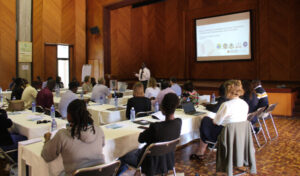How do agricultural graduates contribute to sustainable rural development? The research team “Roots and Routes: Knowledge and Career Trajectories of Kenyan and Tanzanian Agriculture Graduates” from the ongoing course of the IDOS Postgraduate Programme for Sustainability and Cooperation (PGP) gives a glimpse into their on-site research. A report.

Agricultural scientific knowledge plays a critical role in shaping rural economies by fostering innovation and responding to emerging challenges such as climate change, food security, and employment. Higher education institutions serve as key actors in this process, preparing graduates to transfer scientific knowledge into practice.
As part of the Collaborative Research Centre “Future Rural Africa” (CRC 228), our research investigates the career trajectories of agriculture graduates in Kenya and Tanzania. We explore how their education and research experiences influence their professional paths, their contributions to agricultural development, and the alignment between university curricula and labor market demands. By examining these knowledge and career trajectories, we aim to inform strategies for strengthening education-to-employment pathways and promoting agricultural study programmes as future-oriented career choices.
Field Research in Kenya and Tanzania
Our research team under the lead of Dr Michael Brüntrup began the fieldwork phase on 4 February 2025 in Nairobi, Kenya. Over the course of three months, we will closely collaborate with our academic partners from Jomo Kenyatta University of Agriculture and Technology (JKUAT) and Jaramogi Oginga Odinga University of Science and Technology (JOOUST) in Kenya as well as Sokoine University of Agriculture (SUA) and Mzumbe University (MU) in Tanzania. You can find more information on our partners and research here.
Insights from Workshops and Expert Interviews
To gain an in-depth understanding of the experiences and perspectives of agriculture graduates, we organised two focus group workshops—one in Nairobi and another in Kisumu. These sessions provided valuable insights into the challenges and opportunities faced by graduates as they transition into the job market.
In addition, we have conducted numerous expert interviews in Kisumu and plan to continue these discussions in Narok and Nairobi in the coming weeks. The data gathered from these interviews has already led us to revise and refine our survey draft, which will soon be launched to collect further insights on graduates’ job entry experiences and the relevance of skills acquired at university.
Key Recurring Themes from Our Research
The preliminary findings from our workshops and interviews have highlighted several critical issues:
- The need for more practical training in agriculture study programs to better prepare graduates for real-world challenges.
- Limited job opportunities for graduates, underscoring the necessity to promote entrepreneurship in the agricultural sector.
- Climate change as a major concern, emphasizing the need for adaptation measures such as water management, climate-smart technologies, soil restoration, and improved seeds and inputs.
- Strengthening collaboration between universities and the agricultural sector to ensure that research is effectively translated into practice through graduates.
- The vital role of agricultural extension services, enabling graduates to engage with smallholder farmers and support knowledge transfer in local communities.
Next Steps
As we continue our research in the coming months, we look forward to further engagements with graduates, agricultural professionals, institutions, and policymakers. Our goal is to bridge the gap between academic education and labor market needs, ensuring that agricultural graduates are well-equipped to contribute to sustainable rural development.
Stay tuned for updates as we move forward with our field research and survey rollout! After one month in Kenya, the second phase of our research in Tanzania will start from 1 March 2025. To conclude our research stay, we will host a restitution workshop in Dodoma, Tanzania and another one in Nairobi, Kenya at the end of April 2025.

Schreibe einen Kommentar